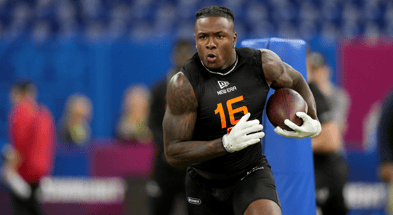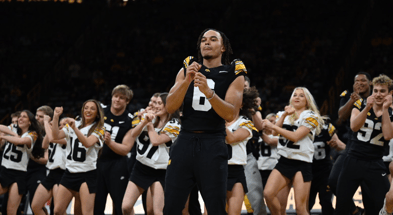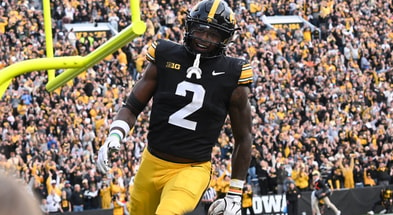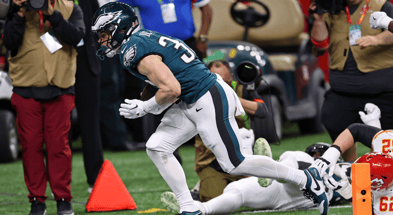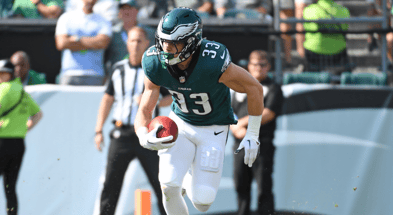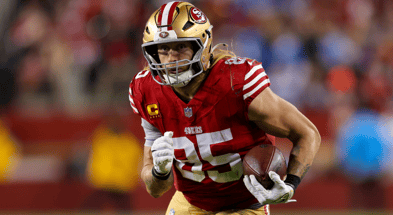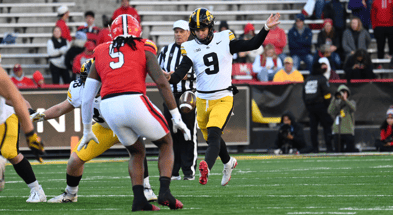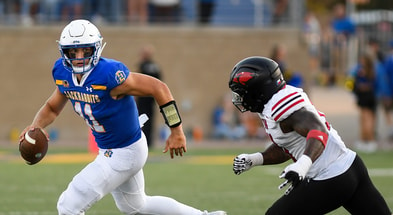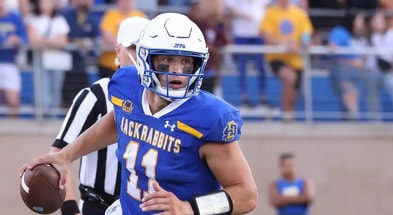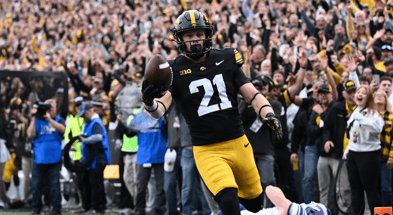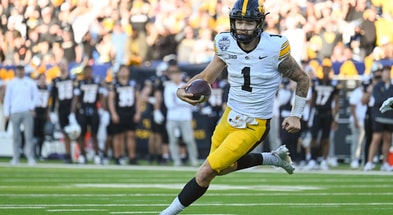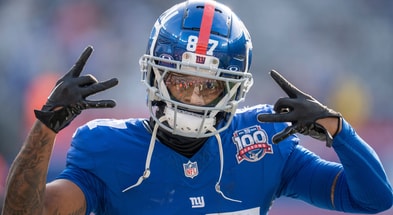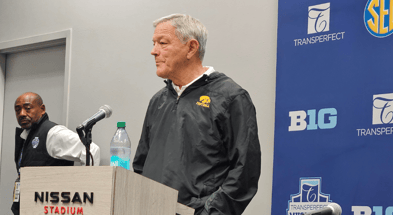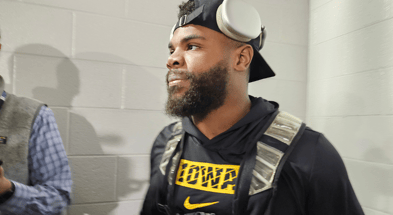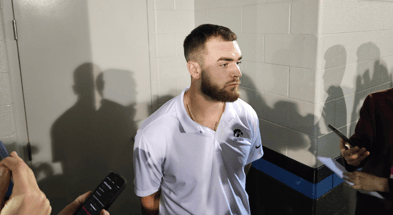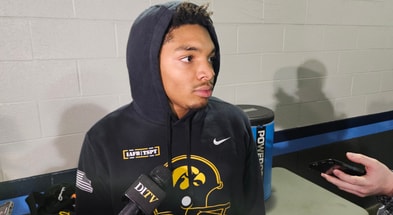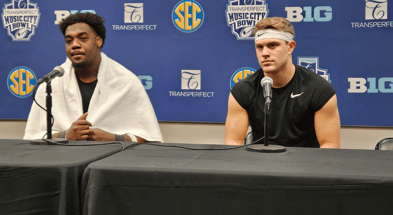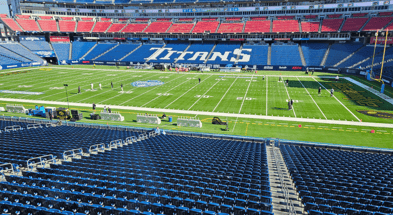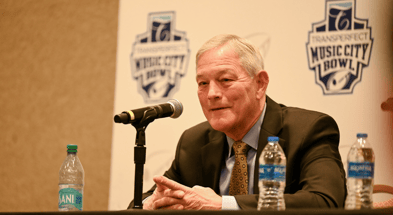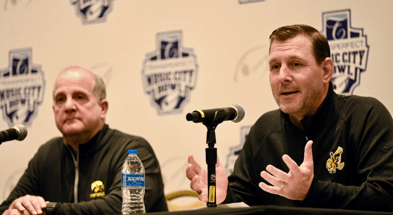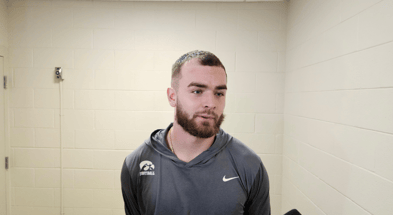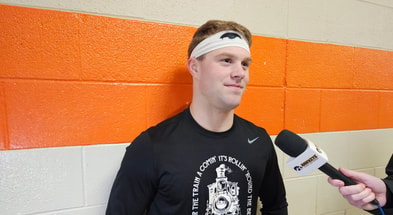Beth Goetz meets the media
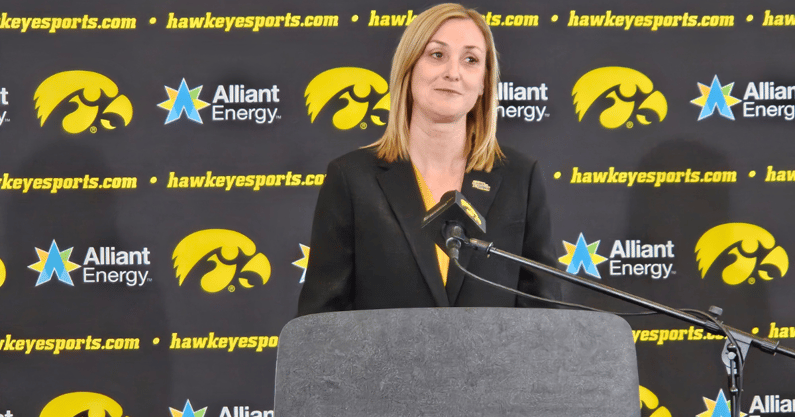
The news made it official last week that Beth Goetz would be Iowa’s new athletic director. On Tuesday afternoon, she met with the media for the first time without the interim tag next to her name. With at least 100 student athletes also in attendance, she spoke about her vision for the changing landscape of college athletics and much more.
BARBARA WILSON: Thank you for being here. We’re delighted that you’re here, especially all these student-athletes. Wow, amazing that you turned out for today. I’m really delighted, and I see several of our coaches out there, too.
I’m going to publicly introduce what you already know. It’s old news now in some ways, but we’re going to keep celebrating as much as we can. I’m delighted to introduce the University of Iowa’s DIrector of Athletics, Beth Goetz, who will now hold the Henry B. And Patricia B. Tippie Director of Athletics Chair.
As many of you know, Beth is a tremendous leader who will take athletics to the next level, to the next stage here at the University of Iowa. I know it. I think you know it. We’re really excited to see where we go.
As you know, we had a national search. Many people asked me why would you hold a national search when you have a crown jewel sitting right here, and my answer was a search substantiates that she’s the right person, and that’s what happened. She went through a very vigorous and competitive search process, and we had a great search committee, and it was a tremendous amount of support for Beth in this position.
I thought I’d share with you just one of many references that we collected about Beth. Someone else said, “Beth is one of the smartest in the business, but she balances that with a high-humility, low-ego approach to her job. She has served in just about every capacity that you can in an athletics department. In addition, she has served on numerous local and national committees, has conducted numerous high-level coaches searching and has engaged in fundraising for multiple major campaigns. She is pressure tested and has always led with integrity and with vision. Leaders around the country will run to Iowa to work with and for her.”
I couldn’t have said it better.
As you know, collegiate athletics is at in some ways a point of multiple transitions. We’re seeing a lot of issues nationally, across the country, across the state even in Iowa, and we need a leader who’s going to take us forward into the next era and a leader who is super focused on student-athletes, and that’s what I’m excited about, and the coaches and the staff here.
The other thing I will say is Beth is also really focused on the academic enterprise. We never want to forget the collegiate athletics is at its best when it’s part of the academic institutions that we all work for and live in and support.
It’s my delight and honor to welcome Beth Goetz as our new director of athletics.
BETH GOETZ: Well, thank you, President Wilson, for your kind words and for this incredible opportunity and the confidence that you have in me. In your leadership, I’ll have a daily example of what it means to build community, embrace a bold vision, and work with a relentless commitment to success. I look forward to working in partnership with you, the Board of Regents, the cabinet and all of our campus leaders to serve and support the mission of this institution.
I am so honored, truly humbled, to be the Henry B. And Patricia B. Tippie Director of Athletics Chair at the University of Iowa.
To the search committee, the chair Nicole Grosland, I’m grateful for your efforts and time throughout this process.
While I’m been on campus for about 16 months and recognize there is still much to learn, it took me about 10 minutes to figure out how truly special being a Hawkeye really is.
To our student-athletes, our alums, coaches, staff, campus partners and passionate fan base, thank you for opening your arms to me. The great tradition, current success and future accomplishments belong to each of you, and I will steward that responsibility with an unyielding effort and great pride.
University of Iowa is a world-class institution. The Big Ten is the best conference in the country, and we have an amazingly talented team.
Before I move on with the rest of my remarks, I’ll ask a little patience as I say a few more thank yous to those who have been so important to me through my journey. I’ve been blessed with many championships in my life, and with each step they have been by my side. My family has shared in every win and loss with me as a student-athlete, a coach and an administrator through countless games, and yes, I know you all still draw straws about who has to call me after a loss. They think I’m a little competitive and not so fun to be around at that moment.
To my mom, my dad, my Aunt Mary, who’s always supported my dreams, to the rest of the Goetz girls, Kristin, Sarah and Katie, my best friends and sisters, your belief in me has never wavered. My brothers-in-law, my nieces and nephews, Olivia, Maddie, Maren, Miles and Gage, so incredibly proud of you all.
I would not be who I am today without your constant love and support. To Jenn, who is my voice of reason, my courage and my true partner, to the Fraser family, I’m so grateful for this amazing crew who is watching literally from coast to coast spreading Hawkeye spirit. You all make me better each and every day.
To my coaches and my teammates, to the athletes I had a privilege to coach and the many colleagues and mentors who have shaped my path, I am grateful for all that I am learned from you. I’d like to acknowledge Gary Barta for his hard work and stewardship in turning over such a respected athletics program and for the opportunity to first join this great Hawkeye team. To Ball State president Geoffrey Mearns and UConn AD, David Benedict, my gratitude and admiration for you both is limitless. Thank you for your investment in me, your friendship and for being true examples of leadership.
To so many others who have touched my journey, thank you for your words of wisdom, for your candid criticism that challenged me and helped me grow, and for being examples of how to serve student-athletes.
For decades, the University of Iowa has attracted and developed generational talents, past and future Hall-of-Fame coaches, trailblazers and industry leaders like Dr. Christine Grant, athletes who have changed their sport and left their mark on the hearts of our fans.
We will work hard to honor all that came before and the next group that is sure to walk through our doors. Our obligation will be to do what is right, to hold tight to our great tradition while not being afraid to embrace a creative and nimble approach that allows the Hawks to be successful in this new age of college athletics.
Supporting our athletes to graduation, the responsibility to represent this great institution with integrity and competing for Big Ten and National Championships will remain our priorities.
We have the great privilege and opportunity to touch lives and to support young men and women in pursuit of their dreams and to help shape the future leaders of this great community, state and beyond.
To our student-athletes, and it’s so touching to see so many of you here with us today. Know that our team will be your biggest champions. Your well-being will be the guiding force for every decision we make. I look forward to continuing to work closely with such an amazing group of coaches. You can put this group against any other in the country. Lisa Bluder, Kirk Ferentz, Tom Brands, Lisa Cellucci, Fran McCaffery, Rick Heller, Sasha Schmid, Jeff Garbutt, Dave Diianni. I’m sure there are others here, it’s hard to see. We have an incredible group of coaches. Their success, their character, the impact that me make on their athletes and the imprint on our institution is second to none.
Our dedicated staff will continue to go above and beyond in support of our teams, and we have so many other credible partners across this campus. Couple this with the generosity of our donors, sponsors and fans whose financial contributions are critical to our success, and together we will provide you with a first-class experience on and off the fields of play.
While pursuit of a University of Iowa degree will always be central to this transformational experience, we recognize the system is changing. We will listen to the voices of our athletes and recognize the value that you bring to our strong Iowa brand.
We will prioritize ensuring we are prepared for what is to come tomorrow, use data to drive our decisions, be an engaged partner with our many stakeholders. Let’s embrace high expectations, commit to innovation, not be afraid to make a mistake, and enjoy all the special moments and victories that come along the way.
Change equals opportunity, and I am confident the Hawks are well-positioned to navigate the shifting college athletics landscape. My pledge to all of you here today is to lead the University of Iowa with this foundation.
I will serve with integrity, transparency and a relentless drive for success. The athletic department will partner closely with the campus and faculty, with our community leaders, with Tony Petitti and the Big Ten Conference, and our loyal and passionate fans.
We will chase winning. We will be champions in competition and in preparing our young men and women for the next 40 years of their lives.
Our commitment is to earn the right and passion of the Hawkeye faithful every step of the way.
We all know the strength that lies in this team. Together, we will embrace the ambitious spirit so prevalent here at the University of Iowa. We’re going to support the growth and academic success of our students. We’ll strive for competitive excellence. Together we will serve to unite and bring pride to this great Hawkeye community. I want you all to know how excited I am to write this next chapter here with you.
Let’s go. Together, we fight for Iowa. Go Hawks!
Q. Now you’re the only woman to be an AD in the Big Ten. What does that mean to you, and what do you think is the key to really empowering more women to be in a position like this?
BETH GOETZ: Yeah, thanks for the question. I stand on the shoulders of so many, and literally in the place where those that came before me fought to be sure that these opportunities existed. I’m incredibly proud to be in that seat.
We have a second female AD, Jen Cohen, at USC that will be joining us, as well. But I understand the responsibility, of course, to have and be the individual that someone might look at and say, hey, I can take that same path one day. Incredibly honored and grateful for all of those that have championed me through my career and given me this opportunity.
Q. Looking around the room, it’s filled with female student-athletes, student-athletes from every different sport. What does that mean to you as a former student-athlete yourself, that they’re here to support you?
BETH GOETZ: Not to jump ahead in the question, but as soon as I said that, I’m thinking, I was you. I know what that experience is like. Believe me, even a few decades later when you’re my age, you’re going to remember every single moment.
It’s certainly not about the wins and losses. It’s about the experience that you get to have each and every day. The challenges that are going to make you better, whether you know that right now or not, and it’s just such an impactful moment. It was in my life, it is in yours, and you just don’t know how this is going to transform the opportunities that you have long after you take off your uniform.
Incredibly touching, and to get to see these amazing young women do what they do each and every day, to do it with such character, class, and certainly with such a high competitive spirit is remarkable.
Q. On Oct. 30, you had to deliver an important decision, probably your most significant public decision in dismissing Brian Ferentz as offensive coordinator. In the three months since, how have you seen that decision received by the fans, maybe the administration you work with and for, and also with football, which obviously carries a huge relationship with what you do?
BETH GOETZ: I think every decision we make is certainly an impactful one and certainly some are more visible than others. Anytime you make a decision about someone who has meant so much to this institution and to a program, it’s always going to be difficult.
But at the end of the day relationships and leadership is about building trust, and you take the information that you have, you make the best decision that you can in the short and the long term. You do that with your values in mind, making sure you’re taking into consideration all those that are impacted, and you go from there.
I think over time, you continue to develop that trust and that respect that even in moments where some may agree and some don’t that they understand how you got to those decisions, and you work hard to ensure that while you may not agree on every account, that they know that you support them, you care about them, and certainly in the case of football, how passionate I am about continuing to support Coach Ferentz and that program moving forward.
Q. Some of the coaches you mentioned, a lot of them really are established, entrenched, people who have been here a decade, two decades. As a new AD, how do you work with them? How do you gain their trust and move forward with them?
BETH GOETZ: Yeah, and it’s probably a good question for you when you say some that have been here for a while. It’s really a privilege to work with these professionals.
They know and love and are passionate about the Hawkeyes, but they also are welcoming with open arms. This is a credit to all of them who allowed me to come in, to build relationships with them, to learn about their programs, to partner with them.
Again, it’s a little bit about learning how they like to operate, how we can best support that, and making sure they know we’re going to do that together. This is a partnership. Their success is our success, and we’re going to work as hard as they are each and every day to help their programs reach their goals.
Q. In the ever-changing landscape of college athletics in which life has changed probably more in the last five years than the previous 50 or so, what kind of role do you see the athletics department having with NIL, with the collectives, and is it going to be more of a partnership moving forward, and how are you going to engage those entities that are obviously key stakeholders to your student-athletes?
BETH GOETZ: Changing college athletics is an understatement. Hopefully nothing has happened in the last 20 minutes that we’re not all aware of here.
But it’s incredibly important that we both honor our tradition at the University of Iowa but welcome and run to what that future is going to look like. We can lead in that space. We can say, hey, it’s important to us that we hear the voice of our student-athletes, that we recognize the value that they bring to the brand, and whether that means increased NIL benefits, increased benefits overall — obviously there’s a lot of moving pieces. We don’t know exactly how that’s going to lay out.
But you’re partnering with everybody around you, certainly on our campus and in the Big Ten. We have a great relationship with the Swarm collective and within the parameters of the rules the NCAA has right now. That’s how NIL needs to operate.
But we’re going to continue to evolve. We want to be ambitious in that space. We want to be creative and nimble and do all that while protecting what is most sacred, which is making sure that these student-athletes are pursuing a degree, will leave here with a degree from the University of Iowa, that they’re supported, that their well-being is taken care of, but everything else is going to modernize, and we’re going to be ready and prepared and nimble enough to adjust to that.
Q. There has been a lot of talk in the fan base about updates to Carver-Hawkeye Arena. Any concrete steps that are either being made now or you’re making headway toward currently?
BETH GOETZ: It has been a wonderful facility for 40 years, and what we need to do is ensure that it serves our needs for the next few decades. That feasibility study started well over six months ago, and we’re excited about some of the opportunities that we have within those updates to consider changes that will directly impact the student-athlete experience, changes that will impact the fan experience, and certainly some other adjustments that will also allow us to make sure that we are generating revenue in a way that’s going to help our entire department.
The timing on that, we are working through a financial study, as well, so doing a little bit of a donor feasibility study, but we’re close to being able to have some focus groups, get some more significant input. We are excited about what opportunities do exist. Again, we have some celebrated wins across many sports in this arena. We want to make sure we position it to collect a few more in the years to come.
Q. This is a little bit more theoretical, but when you have to go about the process of hiring a coach, are there things that are non-negotiable for you or characteristics that you look for during that process?
BETH GOETZ: Absolutely, and there’s really nothing we do that’s more important because when we make a hire of a coach, a head coach in particular, that’s who’s going to be a mentor to all these young athletes that you see around you right now. So it’s critical that we try to — that we make that right decision and that we don’t miss on the things that are most important: Integrity, their commitment to the well-being of the students.
But from a big-picture standpoint, I think there’s a lot of different things you look at. You may have heard me say this before, but I don’t think that every leader is the right leader for every different institution. I think you have to identify the four, the five things that are specific to your needs at that moment in time here at the University of Iowa. That’s how you start your search.
Certainly there’s the need to be an expert in Xs and Os, to understand the recruiting landscape, all of those other pieces, but we want to find a package for who we are at the University of Iowa who shares our values and is ambitious and excited to work in partnership with our team, our institution to go chase championships.
Q. We now have one of the few female athletic directors in Power Five schools. We have the only Power Five women’s college wrestling program. We have a student on campus who’s probably the most famous college athlete in America right now. Does this bigger picture give a look at the University of Iowa as a place that wants to be a trailblazer for women athletes or maybe athletes in general right now?
BETH GOETZ: I think you can look even broader than that. To my right as I look at President Barb Wilson, obviously, we have leadership in our state, as well. But I think it does and always has. Those that are in the room who had the privilege to be here at the forefront of women’s sports here at the University of Iowa, they know what that means. They’ve carried on that tradition, and it’s a great responsibility.
But if you are a young woman playing sports in this country and you are watching what these young women are doing, not just what Caitlin Clark and women’s basketball is doing, but what field hockey is doing, this opportunity to launch women’s wrestling and soccer and growing in so many others, why not come to the University of Iowa, because you’re going to be embraced here, you’re going to have incredible opportunities in competition, and we’re going to support you, the community is going to support you, and again, it’s all about giving them opportunities to succeed while they’re here but really prepare them for what comes next.
We have the tradition to do that, the history to do that, and the track record. Again, to answer your question, yes, this is a destination for our young female athletes, no doubt about it.
Q. You talk about wanting to be the forefront of NIL and try to be creative and all about empowering the student-athlete. With that being said, how tough is it going to be for you to balance what’s in the best interest of the student-athletes versus maybe what’s best for the coaches and even the athletic department? How do you go about balancing all of that while trying to be the leader of all of it?
BETH GOETZ: That’s the question right there, right? There are going to be challenging times. But what we need to do is understand what the parameters are, whether that is provided to us via a lawsuit or by the Federal Government or whatever entity that is, through the NCAA rules. We need to know what the landscape is, and then we will put together the pieces of the puzzle to ensure that we have our priorities in the right order.
There will be changes and significant changes, and that will mean that we’ll need to make different decisions about where to invest. There’s never been a more important time to understand where we can leverage our strengths, and we’ll have to do that across the department to be sure.
But when you do that in partnership with your coaches, with your athletes, one, you come to a more agreeable decision, but we’re also a part of getting to the right place.
Even though we don’t yet know what the outcome is, we talk about this almost every day. Every time we meet with our coaches, we conversationalize this with our entire staff, and so we all know what’s coming.
We’re going to spend a lot of time modeling what outcomes could be, but at the end of the day, we will adjust to what the environment is, and again, with the foundation of ensuring we’re protecting their ability to get a degree, have a great experience, and also live in a world where they can modernize and have an opportunity to earn extra benefits.
Top 10
- 1New
Top 25 shakeup
Baseball poll sees big movement
- 2
Steph Curry
Accepts GM role at alma mater
- 3
Portal Problems
Dan Hurley airs it out
- 4
Cooper Flagg mom
Calls out UNC fans
- 5Hot
Bracketology update
Field of 68 is coming into view
Get the On3 Top 10 to your inbox every morning
By clicking "Subscribe to Newsletter", I agree to On3's Privacy Notice, Terms, and use of my personal information described therein.
Q. Can you give us an update on where things stand with football’s offensive coordinator hiring process and also the cost of coordinators seems to be going up across the country. Phil Parker goes to $1.9 million. Is Kirk operating in your mind in terms of the constructs of his contract in terms of what money he has available for an OC, or is there some flexibility there in terms of what you can offer to him as an athletics department?
BETH GOETZ: Yeah, I feel really good about where the process is. I know there are a lot of people anxious certainly to hear what the final decision is and who is going to be joining that team. I think all those puzzle pieces are going to come together here in short order.
I’ve worked very closely with Coach. Certainly, we have a financial blueprint that we work through, and then from there we’re evaluating each and every current staff member and also those that we may be considering for that role. We also, as you know, have another position open, as well.
It’s really a big picture. We certainly recognize the escalating salaries across the country and want to make sure that we’re great stewards of our resources and also want to do our best to support our programs and make sure that we can continue to be competitive.
Q. I wanted to ask you about this on a personal level. You went from being a college athlete to a Division II coach for 12 years to working your way up. You’ve had some disappointments where you finished No. 2 for a couple of spots. But here you are at a major university, the athletics director position. What does this mean to you from a personal standpoint?
BETH GOETZ: I think when you’re sitting in their seat and the seats of these student-athletes and maybe even before they come — before you get to college, you think about what your path might be, and one of the things I’m so grateful to my family for, for the coaches that I’ve had, is really believing that life is a journey.
I look back and I’ve really learned more from the disappointments or the mistakes you make on the field, which I made quite a few, Coach DiIanni will probably tell you. Those are the things that make you better, so you never know exactly where your path is going to go.
But at the end of the day, if you remain true to who you are, you’re going to land in a place where your values really align, where you feel like you can contribute, you can bring value to them, and they’re going to make you better.
I feel like I’ve found that at the University of Iowa. I really enjoyed the community I was in and the people I was working with at Ball State, and yet when this opportunity came available, and just admired the culture here for so long from afar, I ran to that opportunity.
To now have the ability and chance to lead this program alongside so many great people is just really special.
It’s hard to process, candidly, that this is the moment that you’ve been thinking about and planning for and working toward, but I’m just incredibly humbled and excited about what the future lies ahead.
Q. Speaking of the OC position, I know in the fall you said you were going to let Kirk do his thing, that you wouldn’t be very involved. Has your involvement increased? What does that look like currently?
BETH GOETZ: With every coaching hire that we have, our administration is always engaged. Just as we do on any topic, we’ve continued to communicate regularly and have conversations about the process and about where it’s going.
Again, I feel — we heard Kirk lay out his process for making this higher at the end of the bowl game, and he’s continued down that path, and certainly have been a partner in communication and understanding how we are going to come to making that final decision.
Q. I’m curious, what is your relationship with Tony Petitti like? I’m curious what your role is in the ever-changing world of the Big Ten expansion combining with a lot of extra stuff in streaming, television expanse, and that ties in, of course, with the changing landscape of college athletics which you’ve been talking about.
BETH GOETZ: Well, it’s been just an incredible pleasure to get to engage with Tony Petitti and get to know him over the last six months. Obviously he has not been in his role long, and the second he arrived there were a lot of things that were laid on his lap.
But we’ve had a chance to engage quite a bit. He’s an incredible communicator. I know he talks with all of us regularly certainly in person, but he is always reaching out making sure we are connected on different issues or different topics that are both national or specific to our institution.
I think he is exactly the right leader for the Big Ten, and I’m thrilled we have him during this really dynamic time and looking forward to continuing to partner with him as we move forward.
In terms of, again, the landscape, the footprint of the Big Ten, we are the best conference in the country. We value the right things. We have this great combination of national brands, commitment to broad-based sports, and we’ve got the talent across all of our sports teams that makes us the envy of so many.
We have a chance to work in partnership with my colleagues at our Big Ten institutions, including the four new members that will officially be entering next year, and I feel really good about our opportunities to chart a path forward that protects this great conference and protects our institutions and positions, as well, in the future.
Q. Now that you don’t have the interim tag, is there anything different that you’re able to do or able to focus on or different goals that you have now that you’re kind of here for the long-term?
BETH GOETZ: Yeah, I don’t know about different. I think when I had the opportunity, when President Wilson offered me the opportunity to serve in the interim role, she said, please go do the job. We did that and continued to make sure we were making the decisions that were important to move the department forward.
Some of the items that we didn’t tackle were those that we thought might be disruptive until we had a permanent leader in place. So there are some things that we are now looking to do.
Obviously we’ll have some staff openings and really move forward that way, and really this next six months to a year from a national standpoint is going to be incredibly important.
Being able to truly identify what we want to do, identify who we are, what our bold vision is and how that connects to that moving landscape is going to be critical. So we’re excited to move forward.
But we’ve had the support to continue to make sure we were doing what we needed to do to be successful and just anxious to keep doing that alongside this great team going forward.
Q. You’re not going to do the Deputy AD role as well?
BETH GOETZ: Well, I don’t know that I can navigate two jobs, so we will look to fill that position. It may look a little bit different. While we’re not going to delay too long, I do want to make sure that we hire to where we’re going, so more information is going to continue in the next couple months. I think that position likely will have an external feel to it, but we’re excited about the opportunities and the type of candidates that we know the University of Iowa will attract.
That’s certainly going to be a priority. We’re not going to do that tomorrow, but we want to make sure we have somebody that can come in and serve in the environment that’s going to be most impactful to our department.
Q. As far as priorities, they almost always are or they should start with student-athletes, but beyond the athletes themselves, was there something that you put at the very top, whether it’s the facilities, financial? Is there anything you consider a priority that kind of works with your vision at this point?
BETH GOETZ: I don’t know about a No. 1 and No. 2 in terms of ranking because we all have to do everything at one time.
But the areas that I think are incredibly important is to continue from a financial standpoint to ensure we’re using our resources where we can get our most impact. So we’re looking forward to evaluating in that way from a financial side, focusing on continued revenue generation across the board, engagement with donors and all of that sort of leads into some of these facility renovations and those types of things.
One of the other things I’m really passionate about, and I think an overview of how we analyze our information, analyze our data, too, is to be really intentional about how our success connects to the mission of the institution.
I think there’s great opportunity there, and we’re looking forward to exploring that as time goes on.
Those two things are really important, in addition, again, to — front of mine for everybody is going to be the changing landscape.
Even though we know there are a couple different paths actually modeling that so we’re not responsive I think is a critical piece, so we’re in that work now, and we’ll continue to do that in the coming months.
Q. Have you moved into the big office yet?
BETH GOETZ: Not quite.
Q. Longevity-wise, this program has gone from Bump Elliott, Christine Grant, Bob Bowlsby, Gary Barta, longtime ADs. Just now that you’re in that permanent role, do you view this as a destination job for yourself personally?
BETH GOETZ: Absolutely.
The days of people being in positions for 20 years may have passed us by, but there is no place else I would be better suited for and be more passionate about than to continue to lead here at the University of Iowa.
As you all already know, I’m a Midwest kid. I’m from this community. It’s felt like home from the moment that I came. I feel like we collectively have the best team in the country. Again, these just amazing coaches, incredible student-athletes and the support across campus.
I don’t know what else you would look for that’s beyond these walls.
I’m excited about my tenure here and certainly look forward to staying as long as President Wilson will have me.
Q. You played college sports and you coached college sports. What do you know about both?
BETH GOETZ: You know, I played a long time ago, and it’s starting to be a long time since I coached.
But that experience stays with you. Even though soccer was my sport, it doesn’t mean I understand that game the way it’s played now. It doesn’t mean I understand exactly how our basketball staff or our wrestling staff has to navigate the recruiting landscape because I coached before.
But what I think it does do is it allows me to sit in their shoes, to have empathy, to understand how they experience what they go through each and every day, and I use that, I think, as I build relationships with them. I understand the pressures. I understand the success they feel, and I understand the disappointments.
Those are moments that you take with you I think into every experience that you have, and for me, those have been an asset. I hope our staff and coaches feel like that is helpful.
But that experience of actually being in those shoes as an athlete and as a coach, it gives you a completely different perspective, I think, and I don’t think it’s necessary to have done those things to be a great administrator, but I do think it can be an advantage in making sure you’re providing the right kind of support when it’s needed.
Q. You mentioned at Carver potentially the updates, making it a better environment for student-athletes and fans. Are there any specific ideas you have now that that could potentially look like?
BETH GOETZ: Some conceptual thoughts, and that’s why we worked with an architect, just to see what might be possible. Where it’ll land, again, that’s why we’re in the feasibility study. It’s hard to tell.
But I do think we need increased premium spaces for our fans to have an opportunity to enjoy a game the way people are now used to doing that so they can visually see that and have access to different amenities. Lots of conversation from our students about the environment that they may be able to create in and around the floor is really important.
There’s a lot of amenities that we just need to update as we look at what that’ll be in 20 years.
We’re excited about what we’ve seen so far. We are anxious to start to make that a little bit more public, but we don’t want to show anybody the car they can’t afford. So we want to narrow that down, make sure what we think is important does resonate, and that we’re on the right track with all those constituencies before we really decide to shop that around.

